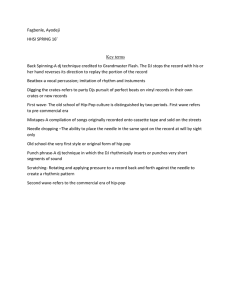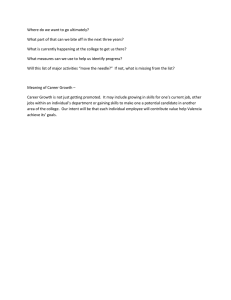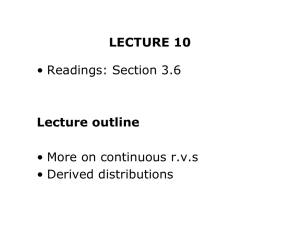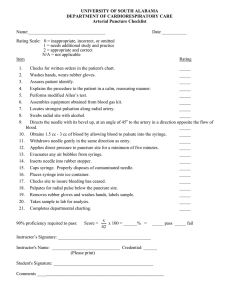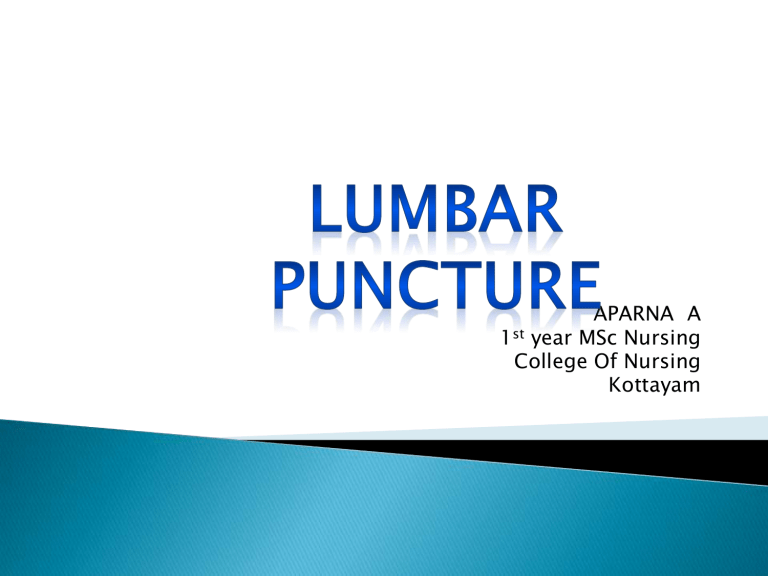
APARNA A 1st year MSc Nursing College Of Nursing Kottayam LUMBAR PUNCTURE or SPINAL TAP is carried out by inserting a needle into Lumbar subarachnoid space to withdraw C S F To obtain C S F for analysis & diagnosis of: ◦ ◦ ◦ ◦ ◦ ◦ Meningitis Meningoencephalitis Subarachnoid hemorrhage Malignancy – diagnosis and treatment Pseudotumor Cerebri Other neurologic syndromes To drain C S F & reduce intracranial space To instill medications Increased intracranial pressure ◦ Head CT before study if focal neurologic findings present to rule out impending cerebral mass herniation • If platelet count is less than 40,000 and Prothrombin time is less than 50% of control Hydrocephalus- Enlarged ventricle size & in suspected normal pressure Hydrocephalus Coma- If C T is negative and I C P increased Meningitis- Exclude mass lesion & confirm diagnosis Use smallest possible gauge [20/22] Prefer atraumatic rather than cutting needle •1.5 in for < 1 yr •2.5 in for 1 year to middle childhood •3.5 in for older children and adolescents •Larger for large adolescents Needle is inserted into subarachnoid space through intervertebral space Spinal cord ends at L1-L2, so sites for puncture are located at L3-L4 or L4-L5 Restrain patient in lateral decubitus position ◦ Maximally flex spine without compromising airway ◦ Keep alignment of feet, knees and hips ◦ Position head to left if right handed or vice versa •Sterile CSF tray with •Spinal needle •Anesthetic such as: Topical- Zylocaine cream or Lidocaine 1% with 25 gauge needle and syringe •Povidone-iodine solution & sponge •Drapes, gauze, and bandages •Manometer, stopcock, tubing and specimen bottles Obtain a written consent for the procedure Explain the procedure to the patient Determine whether patient have any doubts or misconceptions Reassure the patient Instruct patient to void after procedure •Position the patient at one side of edge of bed •Place a small pillow under patient’s head & another between the legs •Assist the patient to maintain position •Encourage patient to relax & to breath normally •The physician cleanses the site with antiseptic solution and drapes the site •Local anesthetic is injected to numb the site and a spinal needle is inserted to subarachnoid space with stylet with bevel up to keep A specimen of C S F is collected usually in three test tubes Needle is withdrawn & a small dressing is applied at puncture site Sent specimen to lab immediately Instruct patient to lie on prone for 2 to 3 hours Monitor patient for any complications Encourage increased fluid intake Headache Back pain [Occasionally with short-lived ] ◦ Disc herniation if needle advanced too far Bleeding or fluid leak around spinal cord Infection, pain, hematoma Subarachnoid epidermal cyst Ocular muscle palsy (1%) Nerve Trauma Brainstem herniation Throbbing bifrontal & occipital headache Dull and deep in character Severe on sitting or standing IT CAN BE AVOIDED BY: Using small gauge needle Keep patient prone after procedure for 2 hours, then side-lying for 2-3 hours, then supine or prone for 6 or more hours Bed rest Analgesics Hydration Epidural blood patch Clear and colourless Secreted by choroid plexus Exists in subarachnoid space It is about 150-200ml acts as shock absorber transports nutrients 1. 2. If C S F is blood tinged 3 samples has to be collected Uniformly stained SA H 1 3. 2 3 CSF clears in 3rd bottle-Traumatic trap 1 2 3 Usually obtained for cell count, culture, glucose and protein testing R B C and Differential W B C Bacteriological –Gram stain and culture Biochemical-Protein[0.15-0.45g/l] - glucose [0.45-0.70g/l] SAH : Spectrophotometry Malignant Tumor: Cytology Tuberculosis: Polymerase chain reaction, Jensen Culture Non-bacterial Infection: Virology, fungal & parasitic studies Demyelinating Disease: Oligoclonal bands Neurosyphilis: V D R L test Cryptococcus: culture, antigen detection H I V : culture, antigen detection & antiviral antibodies
